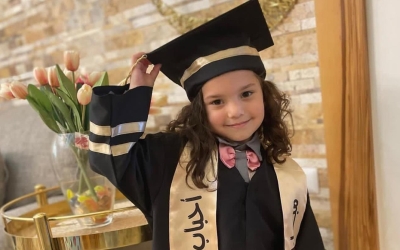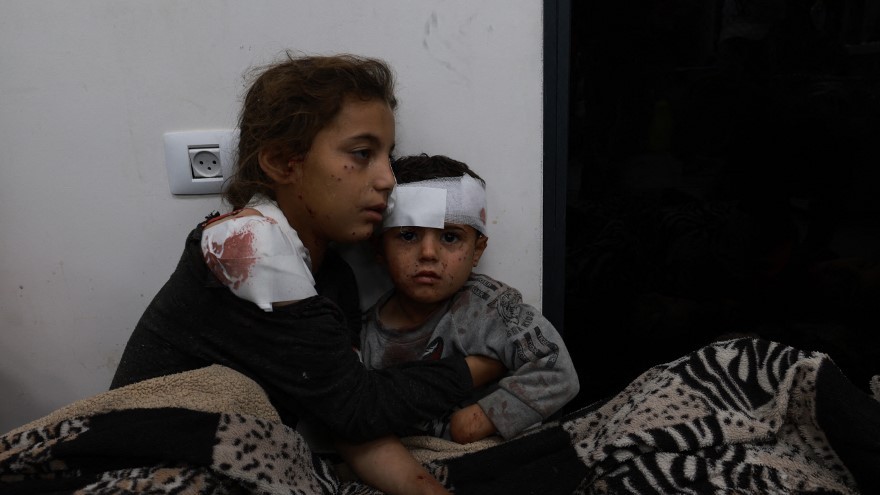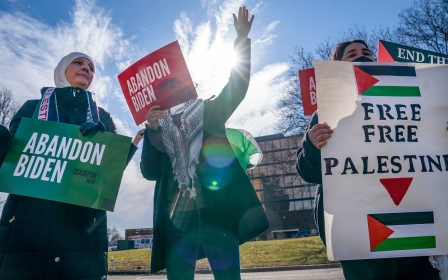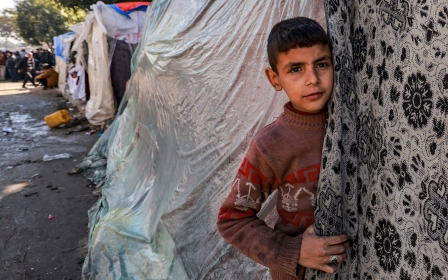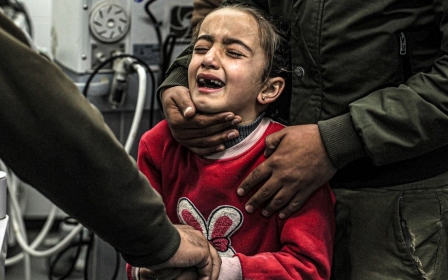War on Gaza: Displaced Palestinians in Rafah shot in their tents as Israeli strikes kill scores of civilians
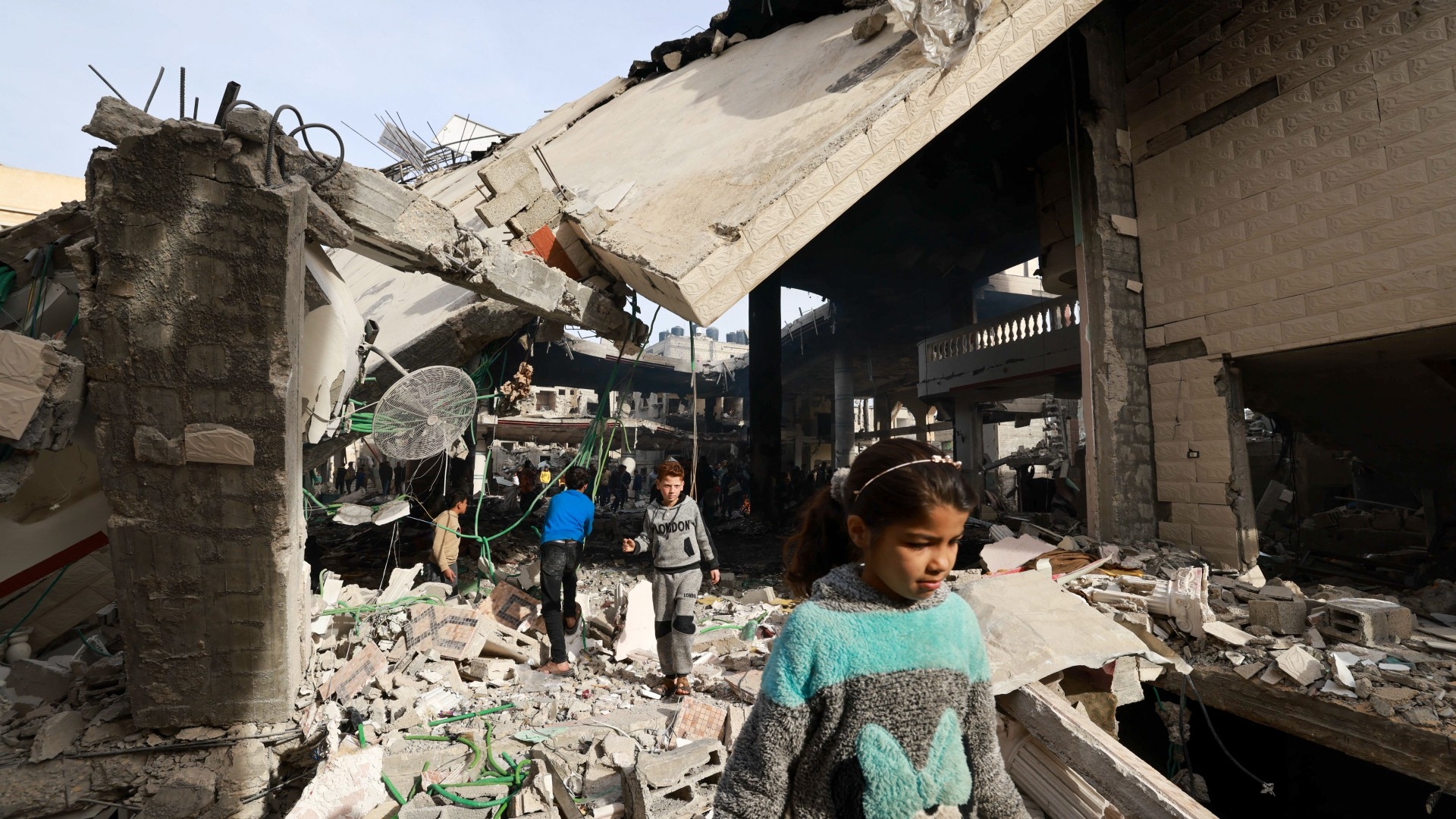
Israel launched air strikes on Rafah in southern Gaza in the early hours of Monday morning, killing scores of Palestinians sheltering in houses and tents and stoking fears of an imminent offensive on the area, which is densely packed with displaced people.
The attacks targeted 14 homes and three mosques in Rafah, Palestinian officials said. The Palestinian health ministry said at least 67 people were killed.
Several people told Middle East Eye they were shot by quadcopters inside their tents on Monday.
A displaced Palestinian from Khan Younis, Wesam Abu Jamee, said he lost two of his sons, one of them disabled, in a quadcopter attack that targeted their tent at 1:45 am.
“The bombardment was so intense. My two sons, Wahib (19) and Ilyas (17) got killed inside the tent,” he said. “Ilyas had a mental and physical disability,” he added.
New MEE newsletter: Jerusalem Dispatch
Sign up to get the latest insights and analysis on Israel-Palestine, alongside Turkey Unpacked and other MEE newsletters
Footage of the two brothers shared with MEE shows them lying dead next to each other in a makeshift tent.
The Israeli military said on Monday it had "conducted a series of strikes on terror targets in the area of Shaboura in the southern Gaza Strip".
It also said it freed two captives taken by Hamas in its 7 October attack in an overnight operation in Rafah. The captives were identified as Fernando Simon Marman and Norberto Louis Har, and are both in good condition, Israeli officials said.
Hamas denounced the raid on Rafah as "a continuation of the genocidal war and the attempts at forced displacement it is waging against our Palestinian people”.
Israeli air strikes on Rafah have intensified over the past week, with dozens of deadly bombardments of densely populated neighbourhoods and residential buildings.
The aerial attacks come after Israeli Prime Minister Benjamin Netanyahu said he had ordered his military to prepare for a ground offensive on the town.
Most of Gaza’s displaced population - around 1.4 million people, including 610,000 children - have fled to Rafah as the last safe refuge, due to intense military operations in the rest of the Palestinian enclave.
The area around Rafah - estimated to be around a fifth of Gaza - has become a squalid tent city. The Palestinians there have nowhere else to go, and are sheltering in makeshift tents or the open air, with little access to food, water or medicine.
Doctors Without Borders has warned that "Israel's declared ground offensive on Rafah would be catastrophic and must not proceed".
"There is no place that is safe in Gaza and no way for people to leave," the group said in a statement.
Children and adults in panic
Umm Ahmad, a resident of Shaboura camp, was an eyewitness to the air strike that targeted a neighbouring house belonging to the Abu Adhra family, killing nine members.
She said she and her family escaped their home after they heard multiple air strikes around 1:50 am. When they returned, their neighbours’ building was in flames.
'The sound of bombardment woke everyone up... Both children and adults were crying out of fear'
- Doaa Hassan, resident of Rafah
Doaa Hassan, a resident of Rafah, told Middle East Eye that the overnight air strikes started at around 12:30 am.
“The sound of bombardment woke everyone up,” she said. “Both children and adults were crying out of fear.”
She said her residential building is also hosting many displaced people and is surrounded by makeshift tents.
“People sheltering in the tents were in panic. I heard people screaming and saying they have nowhere else to flee to.”
Meanwhile, Shahad Safi, a 24-year-old Palestinian resident of Rafah, said she woke up to the sound of intensive air strikes.
“The house suddenly started to shake, but I told myself it's just one strike,” she told MEE.
Safi lives in her grandfather’s three-story house adjacent to the Kuwait hospital.
“The children were in panic. We tried to calm them down,” she added. But the sound of attacks did not stop.
Safi and her family were worried the ground offensive had started, as several displaced people in the same house said the bombardment pattern was similar to the one that preceded the ground offensive in the north of Gaza in October.
“We are very close to Khan Younis, so we were worried that the troops entered Rafah,” she said. “But thank God we survived. We went back to our home.”
Shot inside their tent
After his sons were killed in their tent, Abu Jamee sought refuge at a nearby building. He had to wait for three hours while he was bleeding from wounds in both of his two legs and one hand, he told MEE.
He was then taken to the Kuwaiti hospital for treatment.
'There were so many quadcopters in the air. No one was able to move. We were scared'
- Mohamed Osama Sobh, displaced Palestinian
“They had no medical equipment to operate on me,” he said.
So, he went to Mohammed Yousef el-Najjar hospital, where his wounds were stitched but doctors couldn’t remove the shrapnel due to a lack of equipment, he explained.
“We thought Rafah was safe. It certainly isn’t,” he said.
Mohamed Osama Sobh, 35, was another eyewitness to the attack on the tents.
“There were so many quadcopters in the air. No one was able to move. We were scared,” he told MEE.
“There was nowhere to go outside our tents. When people left their tents, they were also targeted.”
“The attack was for about half an hour. It was very intense.”
Marwa Abu Khater and her family were also targeted inside their tent on Monday. Her sister, 29, was seriously wounded after being hit in the head by quadcopter fire, and her son was shot in both his legs. Her husband also got hit in his back, and she was wounded by shrapnel in her arm, Abu Khater said.
“We heard the aerial bombardment and thought it was to prepare for a ground invasion,” she said.
Warnings of 'disaster'
Israeli Prime Minister Benjamin Netanyahu has said his government’s goal of “eliminating Hamas” would not be possible to achieve without defeating four Hamas battalions in Rafah.
He added that he had ordered the military and security agencies to prepare a plan to eliminate the battalions and evacuate civilians from the area.
The prime minister plans for the operation to end before the start of Ramadan around 10 March, an Israeli official told CNN.
On Sunday, Netanyahu told Fox News that "there's plenty of room" north of Rafah for Palestinians to flee.
But Egyptian officials are wary of a ground offensive that would force Palestinians towards the border with Egypt and further block access to aid through the Rafah crossing, which is the only way in or out of Gaza not directly controlled by Israel.
Egyptian officials and western diplomats were cited by the Associated Press as saying that Cairo is threatening to suspend its 1979 peace treaty with Israel if Israeli troops are sent into Rafah. But Egyptian foreign minister Sameh Shoukri denied the reports on Monday, saying his country is committed to the treaty.
On Friday, Reuters reported that Egypt has deployed 40 tanks and armoured personnel carriers to Rafah to bolster security around the border.
The Sinai Foundation for Human Rights posted a video on X on Sunday showing Egyptian security forces fortifying the fence separating Egypt and the Gaza Strip with barbed wire.
Local sources told the organisation on Monday that the Israeli army's latest attacks struck areas just 300 metres from the Egyptian border as well as areas adjacent to the border fence.
UN and international officials have warned about the consequences of a Rafah offensive, as civilians have nowhere else to flee.
UK Foreign Secretary David Cameron on Monday warned Israel to "stop and think seriously" before launching a ground assault in Rafah.
"We are very concerned about the situation and we want Israel to stop and think seriously before it takes any further action," Cameron told reporters during a visit to Scotland.
Meanwhile, the EU’s chief diplomat, Josep Borrell, said on Monday that he is "extraordinarily concerned" about threats made by Netanyahu to launch attacks on Rafah with no evacuation plan and no prospect of refugee camps in Egypt.
"I am happy to know that two hostages have been liberated but also very much worried by the situation in the border with Egypt where new military operations seem to be taking place by the Israeli defence forces," said Borrell.
The US, Israel's main ally in the Gaza war, has warned against launching a large-scale offensive into Rafah.
US National Security Council spokesman John Kirby told reporters on Thursday that the White House "would not support" such an operation.
"Any major military operation in Rafah at this time, under these circumstances, with more than a million - probably more like a million and a half - Palestinians who are seeking refuge [there], without due consideration for their safety would be a disaster," Kirby said.
This article is available in French on Middle East Eye French edition.
Middle East Eye delivers independent and unrivalled coverage and analysis of the Middle East, North Africa and beyond. To learn more about republishing this content and the associated fees, please fill out this form. More about MEE can be found here.


